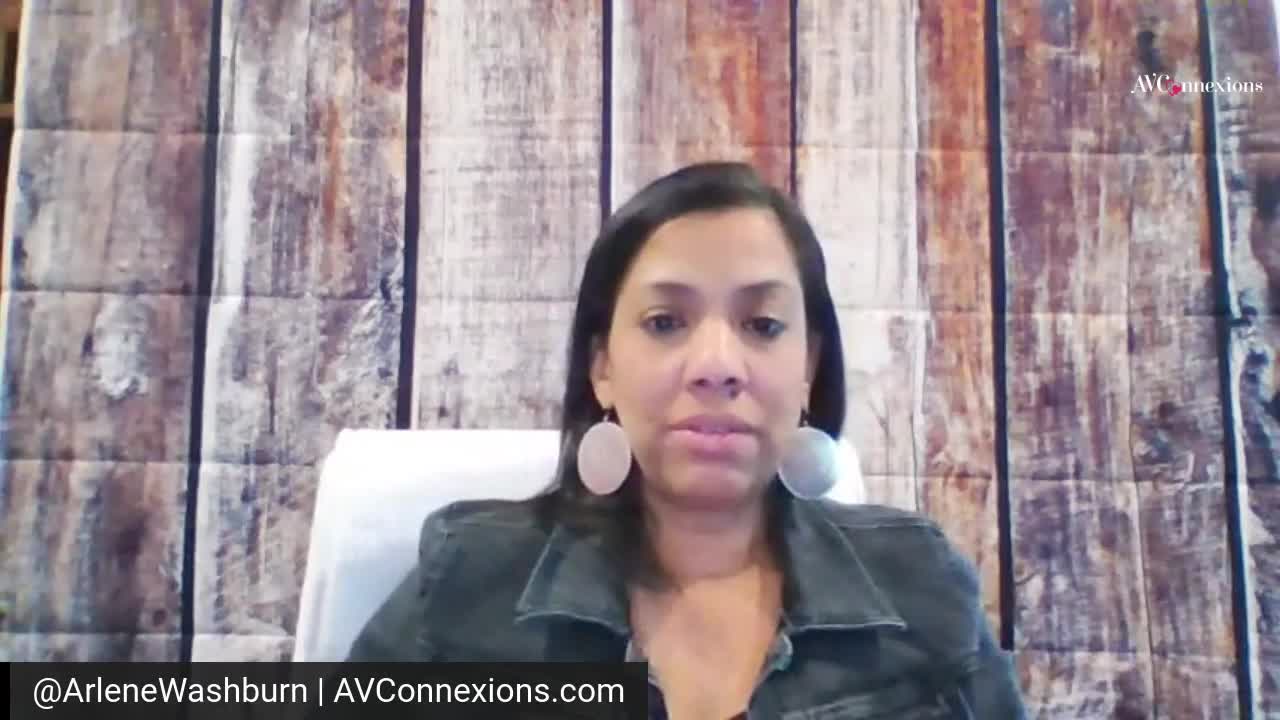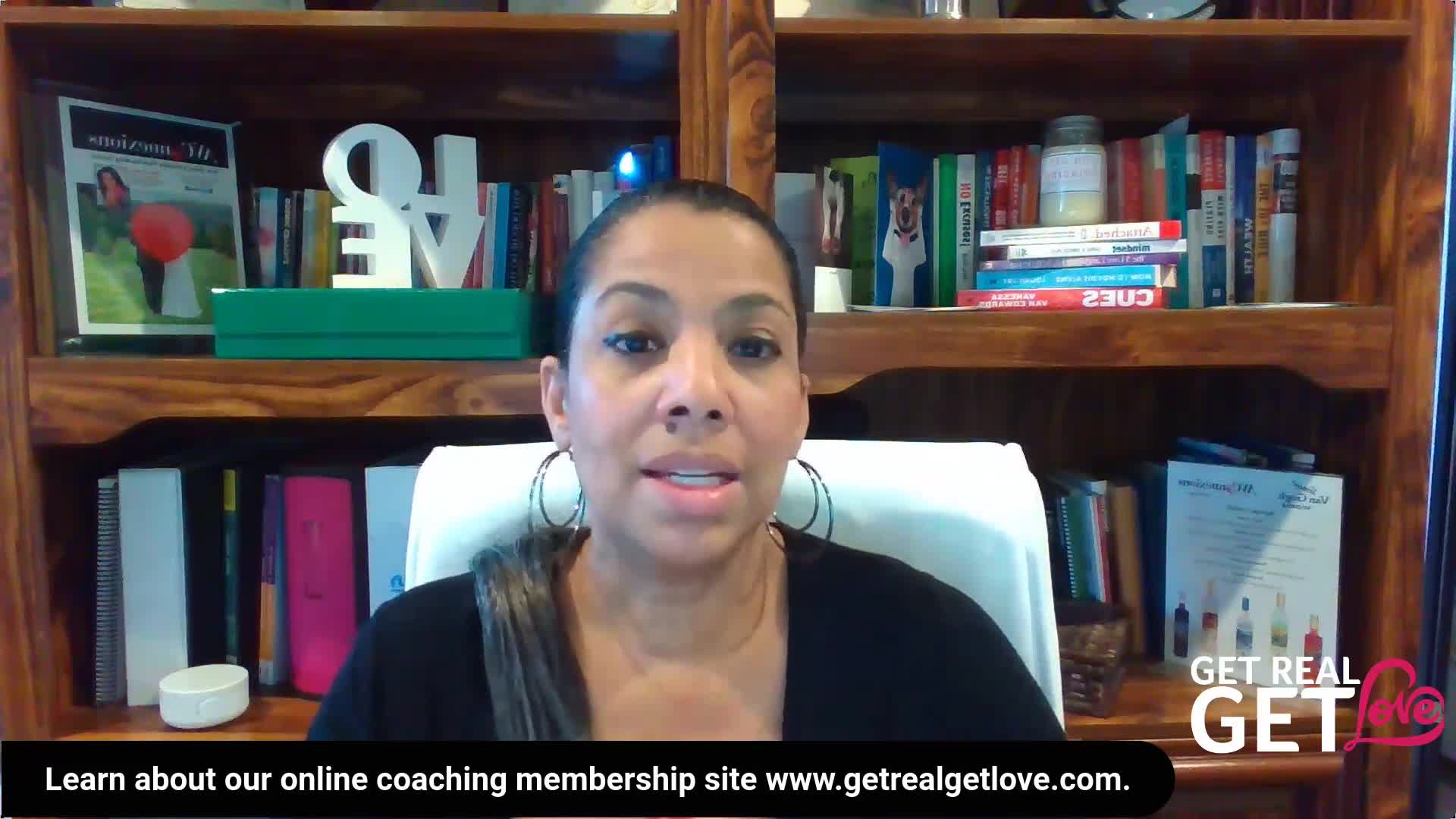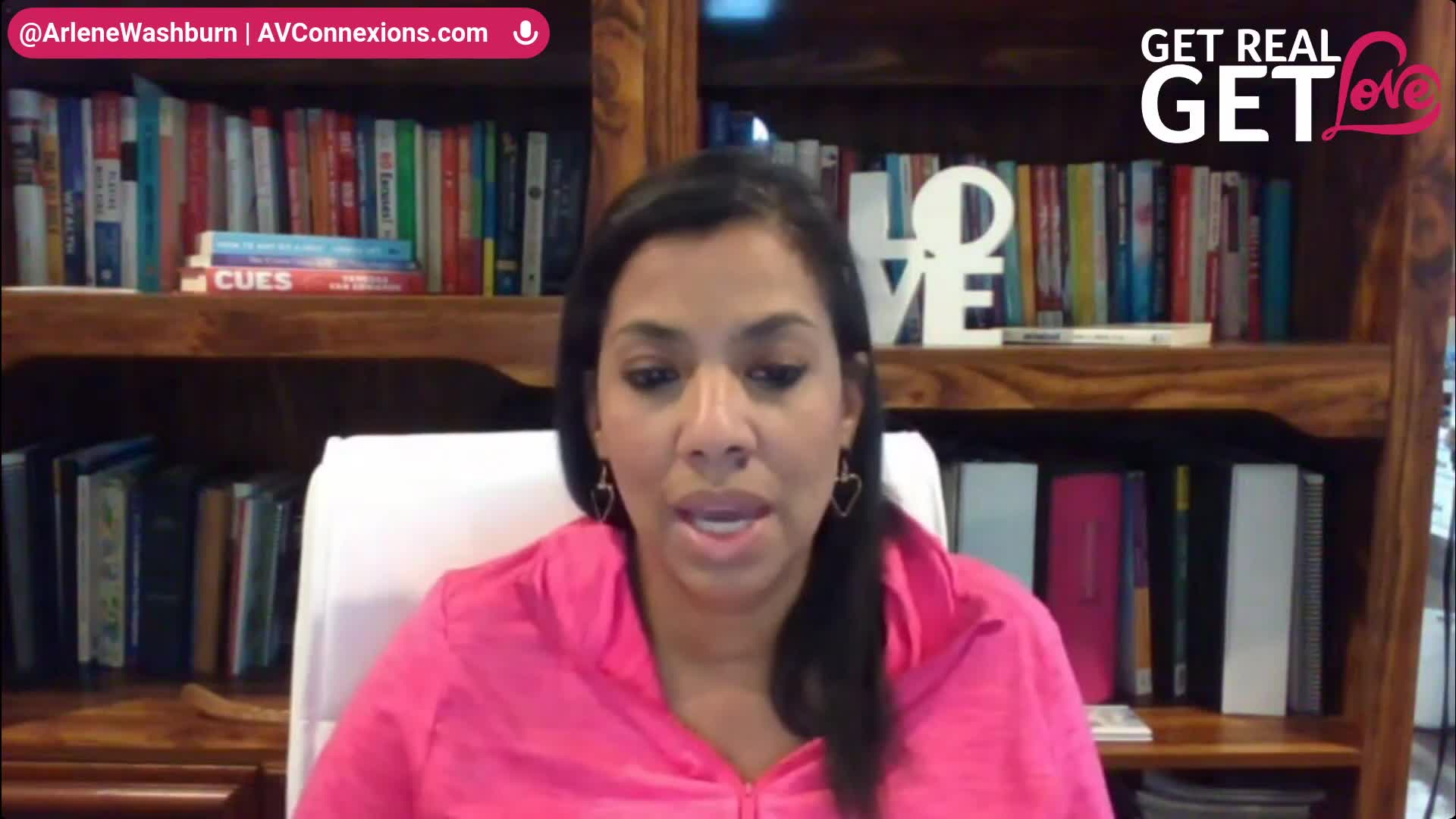CAPTION
welcome everyone to the get real good love show I'm your host Arlene Washburn I'm ascience-based dating and relationship coach and a Matchmaker and today we are covering the topic of how to navigateromantic relationships and this is of course one part one of a series of things because there's only somuch we can cover in each segment and of course I want to start out with theobvious conflict right sounds like two comes up and relationships and all relationships have conflict and it's actually healthy tohave conflict in a relationship is how you solve the conflict how you go about it and how youdeal with and interact with the person that you love so I want to start with numbers ofcourse because you know me I like the data like the science so here's the dataon t' 69% sorry I'm shutting off my phone 69 percent of the conflict betweena couple or in a relationship is never solvable in other words and of course this isgoing to vary from person to person right because each person is going to come with their set ofissues and you're going to have to accept that some things are never going to besolved and not only is it see 90% of the conflict unsolvable it's also repetitive and you'll argue about thesame thing over and over again and so a lot of times when we choose a partner we have torecognize that of course none of us are perfect we all have our traits that are not ideal if you'remessy or you know all the different things that you can think of a person and youneed to decide when you get together with someone if you are okay and willingto tolerate the issues that that person has and so that is number one rightbecause you may not be able to solve them ever so that's said I do want to talk a littlebit about conflict technical problems how to solve conflict or at least how to deal with conflict and War thecouples that do best and I think this is really important to know if you're a singleperson and you're listening to this it's never too soon to learn about how to navigaterelationships because as I said in my post people spend a lot of money hiring matchmakers and they spend alot of time and effort using apps and paying for dates and getting dressed up and doing allthe stuff that is required when you're out there dating to meet someone and alot of these rom-coms that we watch they talk about how to get the guyhow to get the girl but they never really go into how to navigate therelationship once you achieve actually connecting with someone and people go on to self-sabotage because they have amindset and an idea of what relationships are all about that is not accurate so Iwanted to start with this particular topic about conflicts first because I want you to know thatis absolutely normal for there to be conflict in a relationship and so I always love toquote dr. gottman who's one of my heroes when it comes to the relationship space because he isamazing and can predict within 94% or something like that which couples are going to end divorceand in the prediction comes about when they first get together they are able to watch thesepeople interact and have a conversation and they've picked up enough information from those conversations tobe able to determine if though that cup of that particular couples going to end in divorce and hisaccuracy is within 90 something percent him and the people in his lab and so he talks about the FourHorsemen of the Apocalypse and what these are these are the traits of couples that are likely toend in divorce or if you're dating you're likely to break up especially when you come out of limerence ifyou're dating and it's been you know it could vary anywhere between six months to three years where you're inthis little emotional cocktail of hormones and then when you come out of that you now see the personfor who they really are and and this stuff starts to happened so I want to go overwhat these Four Horsemen of the Apocalypse are number one is criticism and this is an areathat I have to constantly work on because I have a very critical nature and I recognize thisabout myself but when you are critical in a relationship it is really really detrimental to howthe relationship flourishes whether or not its large is and it really causes major issues in the relationshipbecause a critical a person when you when you critical what you do is you walkinto a room and you're looking for things that are wrong and so the antidote tothat is to train yourself and I need to remind myself I'll be the first to admit I'msuper critical but to look for things that are happening that are right look forthings that are good look for catch people doing the right things and bring it to their attention acknowledgeit for yourself acknowledge it for and so that's number one criticism number two is defensiveness and of courseif somebody's being criticized then they're going to feel defensive and so what they dois they instead of acknowledging whatever it is as being said to them you know if they ifthey're doing something that's not ideal and somebody expresses you know their dislike for whatever is happening that personwill come back and say well you do XYZ and I can tell you rightoff the bat I know a lot of people follow me on social media theysee a lot of my posts I have a wonderful relationship but this kind of dynamic sometimes happens in myrelationship or I'll criticize and then my husband will say well but you do XYZ right sothat's called being defensive and that's called not taking responsibility for your you know whatever you're responsible in that momentor whatever it is that's happening and so that's not ideal because once you start tobe defensive as I said you're going to then bring up other things that theother person from the past Etc and this is not going to deal escalate right becauseconflict the most one of the most important things about conflict is that you want to deescalate the conflictyou want to communicate and understand one another and that can come out of conflicts but not make thesituation worse the other very important thing that comes out of defensiveness you know you're being criticizedpeople getting defensive content right so content is when you feel like you're better thansomeone and therefore you're going to put them down and you're going to put them down as a humanbeing if you complain about something that they did you not saying something about the ACT yourinstead putting the person down and calling them your this or you always add the absolutes are the worstright using absolutes is not ideal either so contempt is number three and then thelast one is stonewalling and stonewalling is when you withdraw emotionally and what's sad about thatis when you're in a relationship and you start to withdraw you abandon the relationshipyou abandon the person emotionally it's very painful it's very hurtful for whoever's on the receiving endof that and therefore it's you know it's just a very very difficult thing to overcome so you so thoseare the four horses of the Apocalypse all right in a relationship criticism defensiveness content which isequivalent to disrespect and stonewalling so what you want to do instead when you have conflict is tobe able to count and lean on the friendship that you have with this individual and with your partner andin order for you to have friendship it's really important to be connected acting on a regular basisso dr. Terry Terry or Bach who is also one of my mentors talks a lot about how youshould get together with your spouse or your significant other everyday just talk for about 10 minutesor so about whatever it is that's happening in their lives you know ask open-ended questions ask them howthey feel about whatever how do you feel about work are you happy with your careeryou know what do you think of of where we live you know should wemove should we do something different like open-ended questions really not yes or no questions soI'll take that last one back but getting people's to share their desires their goals their dreams and talkingin really deeply getting-to-know-you partner that starts to build my boyfriend he's this and he's batting he's and yet talkforever know your has been people see those you never know how you really feel andyou admire and what are the things that you respect about them all of thosecome into play so instead of having this stuff in your mind it's so importantto share this with your significant other especially we're not going to go into the fivelove languages but if someone in your life they're lovely which is words of affirmation they particularly neat that evenmore right because then you start to add to their love tank you know you start tofeel their love tank by giving them the thing that they desire so it's really important to let people knowhow you really feel and you know what you admire and all those things so that theyknow and instead of just telling others and that also builds intimacy and friendship andthe last thing I want to say is dr. gottman talks about making big Ed's small they could be smallthey could be you know big things or small things an example would be that when you're with yoursignificant other and you say something to them and they don't even acknowledge you that's very hurtful when you'rehaving a conversation with your significant other could be about anything it could be anything insignificant the fact that you'retrying to interact with them and that they don't even look your way they don't even respond theydon't acknowledge they don't make any kind of movement facially or verbally or anything thatis very painful it may seem very insignificant but that kind of takes away from the friendship and thewhat he likes to call the love map or you know the the Friendship basicallythat these little things chip away at your relationship so it's so important that when you're around yoursignificant other and they're talking to you or they're trying to hold your hand are theyany kind of bid for affection or intimacy that you acknowledge and that you buy into itright because if you want to have a loving and wonderful relationship that is part ofwhat it takes so he talks about two things one is positive sentiment override and the other one isnegative sentiment over right now this is really important because if you don't have the friendship andall the the things that I mentioned before in a relationship what you create is a negativesentiment override which means that anything could get a negative reaction for your from your significant other in otherwords you can walk into a room and say one simple thing and you may not beraising your voice you may not even be critical but the person has a negativesentiment override towards you because of the nature of your relationship a ship and they will overreact and saydon't you know like don't tell me what to do or how to do it or whatever right so bycreating all these positive you know actions and filling their love bucket if you willyou then create a positive sentiment override so that the when when you are having a bad day and yousay something kind of abrupt if your significant other has that positive outlook do they'll dismiss it they'll laughthey'll make a joke of it they won't get offended they won't get defensive so this is why the Dynamicsof a relationship or so important because little things can escalate to something like tremendousright and cause a divorce even or an argument that becomes physical or abusive because ofeverything that's been going on little by little it starts to build up right and it's really important whenyou have conflict and things don't go in the positive positive direction and there's a lot of stuff that I'mgoing to share with you over the next few weeks this series about how to navigaterelationships and we are going to cover more about conflict and things that you can dohowever what people use that are you know very effective tools for dealing with conflict ishumor but it's got to be time to properly write you don't want to be making jokeswhen someone's trying to be serious about something but there are ways to use humor the most importantthing and one of the best things you can do is to apologize quickly if there'ssomething that you know bother someone and you're doing it whether you agree with themor not apologizing and acknowledging and validating is huge and it doesn't take anything away from you and the otherthing that I would say is just to when you have conflict and when you're having a conversationthat is not going in the right direction one of the things that causes that isbecause you walk into an argument or a conversation wanting to be right and I often talk aboutthis if you have a relationship with someone that you love that you chose to havein your life then this need for being right she's sort of go out the window rightbecause if your app Partners if you are a partnership when you're in Partnership you're not lookingto blame to be right to be wrong you're looking to get to agreement you're looking for collaboration yourlook you're looking for cooperation and that means that you're looking for that coming from them and ithas to come from you and so the best thing that I can offer in terms of conflict is goingto conversations without a desire to be right but a desire to get to agreement and as I saidbefore you know and everything else that I've covered you know from the work that I've learned through dr. gottmantried to deescalate you know D escalation is such an important thing and this is completely an analogy andsomewhat off topic but when you situations with you know law enforcement and people gettingkilled and stuff like that a lot of it happens because there's no effort to to both ofyou agree upon whatever up you know obscure word that you used to say to me that it's timeto take a timeout and while once people are activated is very difficult to communicate andthen the last thing I would say is if you can't if not about the someone wrong if yousay there's some what is wrong with you then they're going to shut down and they're going toget activated and then I'm going to be able to listen to you so that's just a little bitof what I believe based on what I know and also the stuff that I'mbringing to you from dr. gottman I'm going to bring some other experts doctor or bucketcetera these are people who have been doing research for a very long time and soI'm sharing some of of their data and their expertise with you and curating that because I think it'sjust such an important thing to know how to navigate relationships and what will happen andthat you can navigate conflict in a way that helps to deescalate to get to agreement and tohave Harmony so that is what I want to share with you today and will continue this conversation nextweek Wednesday at 2 p.m. Eastern Standard Time I'm going to continue to talk about how to navigate relationshipsand I'll probably be bringing some more content about conflict because there is a lot that goesinto it that you can learn so that you can have a better more fulfillinglife and more harmonious life with your significant other and as always I want to share withyou that tonight the love Insight show we're talking about advice that the guru's are sharingthat may be detrimental to you so I hope you'll tune in tonight on TheLove Inside show on Fireside so that you can hear some great information about how to choose adating coach which dating coach is you shouldn't be listening to and what are they saying out there thatreally is not ideal for someone who's single who's trying to figure things out andthe last thing they need is to hear bad information that's not going to help getthem to relationship goals so I hope you'll join me tonight at 6 p.m. EasternStandard Time There's the link love inside show Fireside and until next week I will see you rememberwhat I always say everyone deserves to love and be loved let's see you next week cheers
 Arlene Washburn
Arlene Washburn
![]()


